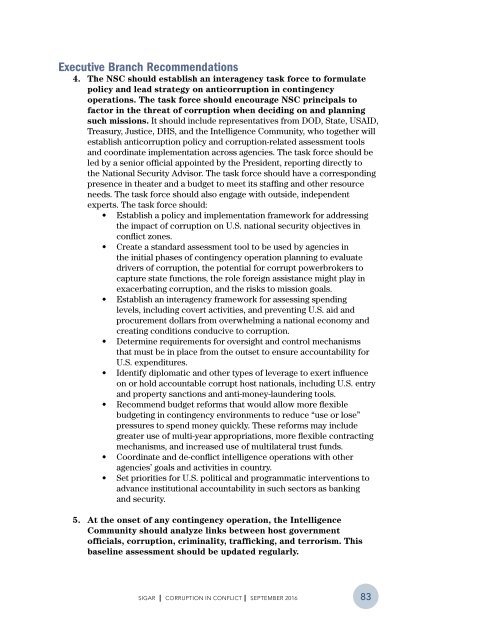CORRUPTION IN CONFLICT
5IlaWjQej
5IlaWjQej
You also want an ePaper? Increase the reach of your titles
YUMPU automatically turns print PDFs into web optimized ePapers that Google loves.
Executive Branch Recommendations<br />
4. The NSC should establish an interagency task force to formulate<br />
policy and lead strategy on anticorruption in contingency<br />
operations. The task force should encourage NSC principals to<br />
factor in the threat of corruption when deciding on and planning<br />
such missions. It should include representatives from DOD, State, USAID,<br />
Treasury, Justice, DHS, and the Intelligence Community, who together will<br />
establish anticorruption policy and corruption-related assessment tools<br />
and coordinate implementation across agencies. The task force should be<br />
led by a senior official appointed by the President, reporting directly to<br />
the National Security Advisor. The task force should have a corresponding<br />
presence in theater and a budget to meet its staffing and other resource<br />
needs. The task force should also engage with outside, independent<br />
experts. The task force should:<br />
• Establish a policy and implementation framework for addressing<br />
the impact of corruption on U.S. national security objectives in<br />
conflict zones.<br />
• Create a standard assessment tool to be used by agencies in<br />
the initial phases of contingency operation planning to evaluate<br />
drivers of corruption, the potential for corrupt powerbrokers to<br />
capture state functions, the role foreign assistance might play in<br />
exacerbating corruption, and the risks to mission goals.<br />
• Establish an interagency framework for assessing spending<br />
levels, including covert activities, and preventing U.S. aid and<br />
procurement dollars from overwhelming a national economy and<br />
creating conditions conducive to corruption.<br />
• Determine requirements for oversight and control mechanisms<br />
that must be in place from the outset to ensure accountability for<br />
U.S. expenditures.<br />
• Identify diplomatic and other types of leverage to exert influence<br />
on or hold accountable corrupt host nationals, including U.S. entry<br />
and property sanctions and anti-money-laundering tools.<br />
• Recommend budget reforms that would allow more flexible<br />
budgeting in contingency environments to reduce “use or lose”<br />
pressures to spend money quickly. These reforms may include<br />
greater use of multi-year appropriations, more flexible contracting<br />
mechanisms, and increased use of multilateral trust funds.<br />
• Coordinate and de-conflict intelligence operations with other<br />
agencies’ goals and activities in country.<br />
• Set priorities for U.S. political and programmatic interventions to<br />
advance institutional accountability in such sectors as banking<br />
and security.<br />
5. At the onset of any contingency operation, the Intelligence<br />
Community should analyze links between host government<br />
officials, corruption, criminality, trafficking, and terrorism. This<br />
baseline assessment should be updated regularly.<br />
SIGAR I <strong>CORRUPTION</strong> <strong>IN</strong> <strong>CONFLICT</strong> I SEPTEMBER 2016<br />
83


